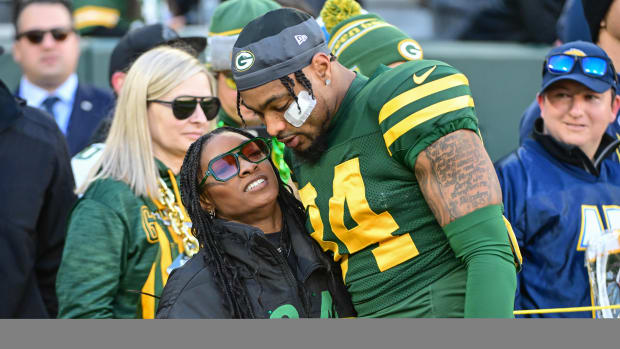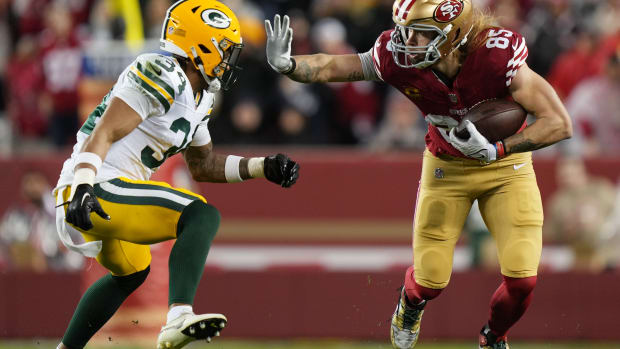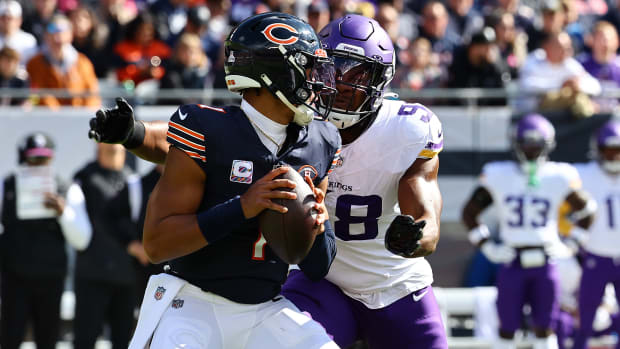Let the Cap Savings Continue for Bears
Placing a franchise tag on Allen Robinson rated as the first major Bears free agency decision.
However, it was a no-brainer considering he would have been able to walk if they hadn't done it. The first decisions of free agency were cutting Buster Skrine and not picking up tackle Bobby Massie's contract option, resulting in about $8 million total cap savings.
The Bears face several other bigger decisions before they can begin free agency in a5 week as they try to fit in a possible $17.9 million cap hit for Robinson against what is now reportedly going to be $182.5 million in salary cap availability. For the Bears, it's about $190 million based on the $7 million they carry over from last year's cap.
The decision on Robinson, their cash carryover from last year's salary cap and the early moves made have left the Bears $22.5 million over the cap according to Spotrac.com figures. Those numbers did not include the Massie move's effect. So, they are actually closer to $17 million over the cap.
A potential trade for Russell Wilson aside—chiefly because there's no way to project how a possible restructured deal for a player with so huge of a contract might work—there obviously must be restructuring of current deals to get the Bears under the cap.
There could also be other difficult decisions on cutting players coming.
Here are the next big decisions facing the Bears in free agency after the Robinson tag.
1. Eddie Jackson, Cody Whitehair restructuring
Jackson has a cap hit of $11.45 million this year, with $8.95 million in salary that can be put to work in the form of a bonus guaranteed which is prorated over the remaining years of his deal. They could do the same with guard Cody Whitehair's $6.5 million in salary. ESPN's Jeremy Fowler last week reported both are being examined . It's possible there could be more restructurings.
2. Akiem Hicks
Something has to give here. One of their greatest defensive assets turns 32 during this season and if they cut him they gain back $8.8 million of cap space. That might seem like a lot but Hicks brings way to much to the defense to simply lose his services. Few NFL teams have interior defensive linemen so disruptive to opponents. If he's part of a quarterback trade, they'd get similar savings.
When they had Hicks and Eddie Goldman together on the line in 2018 they led the NFL in run defense and caused plenty of trouble for opposing quarterbacks. During the past two seasons they've had the two together on the field in only about five total games and their run defense has given up about 30 yards more per game with one of them or both of them missing. Hicks is entering the last year of his contract, and if they gave him a contract extension they could turn some of this year's $10.4 million salary into a huge amount of bonus payable immediately but prorated over an extension. How far in the future are you going to count on a 32-year-old, 352-pound defensive lineman? Maybe they do this with some dummy years at the end of the deal, like they've done with Danny Trevathan's contract and Kyle Fuller's deals. Would Hicks even want to do this? It's a touchy situation but could go a long way toward solving their cap dilemma.
3. Kyle Fuller
Fuller has plenty of prorated bonus money on his deal which is untouchable but Spotrac. com says he does still have about $6 million in salary capable of being converted to bonus money and floated over some dummy years at the end of his deal if they want extra cash under this cap. The other thing they could do is release him or trade him. He is their best cornerback, a year removed from back-to-back Pro Bowl seasons. He turns 30 in a few days. The Lions last year traded one of the game's better cornerbacks in a similar situation. They sent Darius Slay to Philadelphia.
4. Jimmy Graham
This might be one of their most difficult decisions. Cutting Graham would save $7 million but his dead-cap space would still be $3 million, so the actual savings the Bears get back in cash would be $4 million. Is that enough to justify losing him after what he did last year? He produced in a big way with a team-high eight touchdown catches and 50 overall receptions. At age 35 during this season, further decline in skills might occur. Then again, there is another issue affected if they cut Graham. He is a friend of Wilson's and if the Bears cut him, is it possible it could affect any potential trade? Graham was a great mentor for Cole Kmet and the second-year tight end is no finished product.
5. Charles Leno Jr.
They've dumped one tackle already and have virtually none on the roster right now. If they wanted to get rid of Leno, they most likely would have done it. There is gerat potential for restructuring here even though part of the salary cap space he eats up is $1.4 million in a restructured bonus. Leno has a salary of $8.9 million easily converted to more bonus money and future years on a deal which expires after 2021. But how long in the future do they want to continue using a left tackle whose inconsistency has frustrated at times considering he turns 30 late this season? Often teams can turn to free agency in issues like this, cut the player and go to a lower-paying option. But the tackle position is low on talent/bargain rates in free agency. They may need to turn to the draft already for a right tackle. What to do here is almost as perplexing as Graham's situation but there is a real savings opportunity if he's cut or extended.
6. Khalil Mack
More restructuring to squeeze cash out of a deal with $2.6 million in a restructuring bonus already being paid on it normally would seem out of the question. Yet, Mack's contract was so large it's possible. Players always like cash up front more and Mack counts 14.01% of their cap space this year according to Spotrac.com. His salary is $17.05 million and it's guaranteed, but it's salary paid each week and not bonus money paid up front in a big chunk. Everyone loves getting those huge immediate pay days.
Twitter: BearDigest@BearsOnMaven




